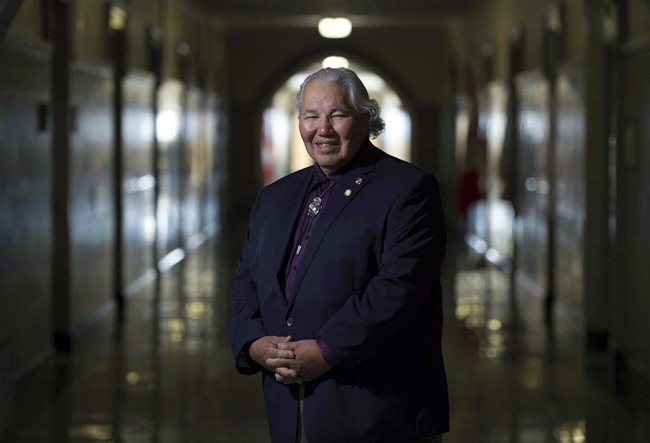The man who led the Truth and Reconciliation Commission that condemned Canada’s history with residential schools will now oversee a probe into a northwestern Ontario city’s police services board as the community grapples with tensions between its police force and Indigenous residents.

The Ontario Civilian Police Commission says Sen. Murray Sinclair will lead an investigation into the Thunder Bay Police Services Board, which is responsible for a force that has come under fire from local Indigenous leaders in recent months.
Several northwestern Ontario chiefs have criticized police handling of the deaths of local youths in the city, going so far as to ask the RCMP to take over the investigations.
In May, the OCPC agreed to a request from one local leader to open an investigation into the police services board.
Monday’s announcement naming Sinclair as the lead investigator also spelled out the OCPC’s specific concerns with Thunder Bay police.
It says it has “serious concerns” with the quality of police probes into the youth deaths, statements made by members of the police board denying that racism is an issue, and the fact that the local police chief is now facing criminal charges.
Police chief J.P. Levesque was charged with one count each of breach of trust and obstruction of justice in May.
The OCPC said Sinclair’s investigation will examine many aspects of the Thunder Bay police board, including its policies, procedures and overall performance.
“The OCPC investigation is not punitive and not directed to any specific conduct issues,” the Commission said in a statement on Monday. “Ultimately, there is a public interest in ensuring that the board is meeting its obligations.”

Get breaking National news
The Nishnawbe Aski Nation, a political organization representing 49 First Nation communities in northern Ontario, applauded the appointment of Sinclair.
“We are dismayed by the dysfunctionality of the Police Services Board, and are pleased that the provincial authority over police boards … has taken swift and meaningful action to address this crisis of confidence in policing,” NAN Grand Chief Alvin Fiddler said in a statement.
Sinclair, the first Indigenous judge appointed in Manitoba, is expected to produce an interim report on the investigation by Oct. 31, and a final report by March 31 of next year.
Tensions between Thunder Bay police and Indigenous communities have come to the fore in recent months due largely to the recent deaths of First Nations youth.
Tammy Keeash, 17, was in care at a Thunder Bay group home, far from her community of North Caribou Lake First Nation, when she disappeared on May 8. Her body was pulled from the Neebing McIntyre floodway seven hours after she was reported missing.
Days later, the body of 14-year-old Josiah Begg from Kitchenuhmaykoosib Inninuwug First Nation was found in the McIntyre River after a lengthy search.
The Thunder Bay force is still actively investigating both deaths, as well as another that occurred nearly two years ago.
Stacy DeBungee, 41, was pulled from the same river in October 2015. According to a statement posted on his family’s lawyer’s website, Thunder Bay police publicly declared DeBungee’s death non-suspicious within three hours of when his body was found and non-criminal the next day.
DeBungee’s family filed a complaint with the Office of the Independent Police Review Director, which has since been expanded to include the deaths of Keeash and Begg. That investigation, which is separate from the probe led by Sinclair, is ongoing.
Local chiefs travelled to the provincial legislature last month to plead with the RCMP to take over the investigations, citing mistrust of the force in Thunder Bay.
In June, Ontario’s chief coroner asked York Regional Police to get involved in the investigation of Begg and Keeash. Thunder Bay police welcomed the coroner’s decision to bring outside help, saying more investigative resources will serve the interests of the public and the families.







Comments
Want to discuss? Please read our Commenting Policy first.